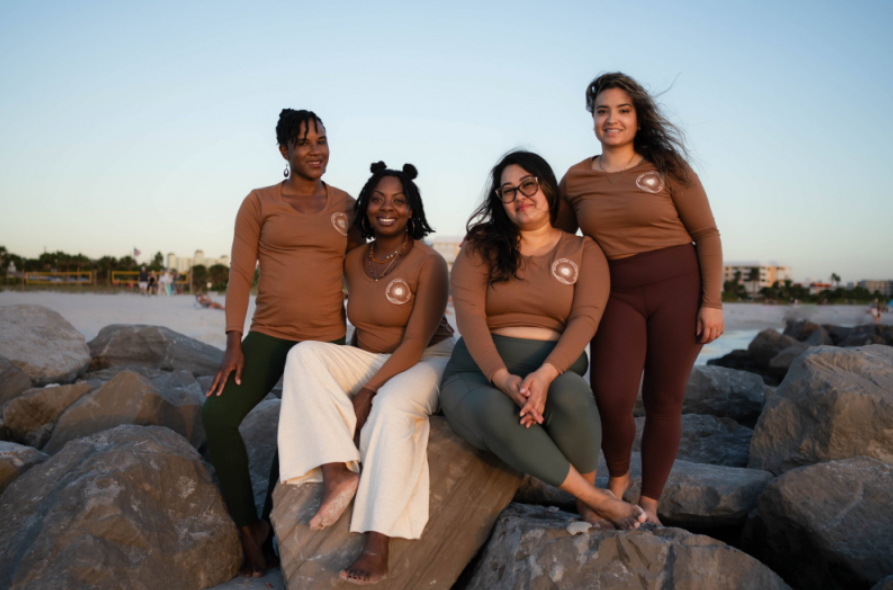
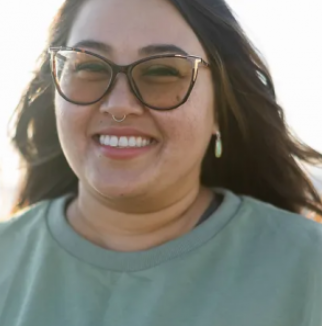
Four certified yoga teachers and wellness curators – all of whom are women of color – found each other through Mindful Movement, a wellness initiative in St. Pete, and formed the Brown Care Collective to assist Black and Brown bodies in their healing journey with culturally specific and collaborative wellness events.
Monica DeChaine never really anticipated becoming a yoga teacher. She did go to India and study yoga. She also attended teacher training and obtained a teaching certificate, but she thought it would all enable her to dive deeper into her personal regimen. When she came home to the U.S., though, she had a moment of clarity.
“I realized that I was always surrounded by the same style of woman: white, young, able-bodied and cis-gendered.”
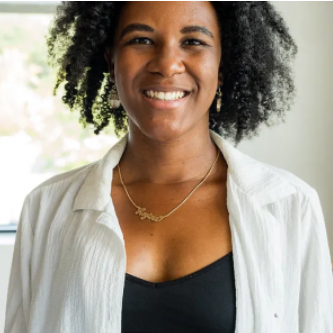
Regina Fields got into yoga right after college. Her best friend suggested it. Though she complained during her first class, Fields said she had a full body and mind, visceral feeling — one she’d never experienced before after a workout. For the next eight years, she chased that feeling, but had a hard time finding her community.
“I was the only person of color in the room most of the time. Everything about me was different. Hot yoga destroyed my perm. I faced a real inner battle.”
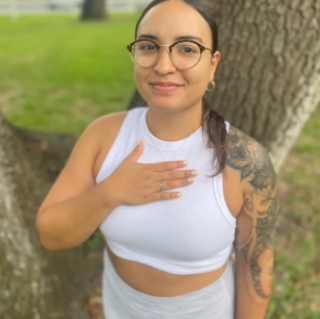
Alexandra (Alex) Duran grew up in an inner-city, low-income home. “Wellness” wasn’t even on her radar until her mid-20s when she started working at Lululemon, which wasn’t quite the right environment for her. Environment aside, she loved what she was learning about mindfulness and yoga. Down the line, she decided to enroll in yoga teacher training.
“I was the only person in the room who looked like me, though. Some cultural and childhood trauma came up when I went through the training, and the people there didn’t really know how to hold space for me.
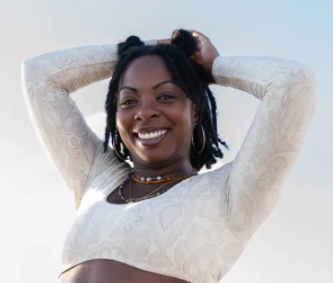
Cameron Burris has been a social worker for a decade. She’s worked with many communities and saw first-hand what inclusive community-building looks like. She felt she could make an even more significant impact as a clinician, so she returned to school for a master’s degree. She offered therapy services to individuals and couples and helped many people recover from traumatic experiences such as child and substance abuse, being grandparent caregivers, domestic abuse and more. But she found that as a Black woman — usually one of the only Black women in the room — she clashed with the “power-over” style of leadership.
“My parents helped me recognize my worth and the value of my worth. I decided to go out on my own.”
DeChaine remembers being surrounded by Black and Brown bodies and listening to R&B music while taking one of Fields’ yoga classes.
“I felt completely at home, and I thought to myself, more of this. I need more of this. More of Regina. I want to be in spaces that play R&B music and wear something other than the usual tight pants and strappy bra. It led me to feel like there had to be a space for us.”
But DeChaine, Burris, Duran and Fields had trouble finding that space. Tired of barriers to access to wellness for Black and Brown communities, dealing with microaggressions and lack of representation, they decided to create what they desired, and Brown Care Collective was born.
“It’s all about meeting people where they are,” Fields said. “It’s about making self-care accessible to our community.”
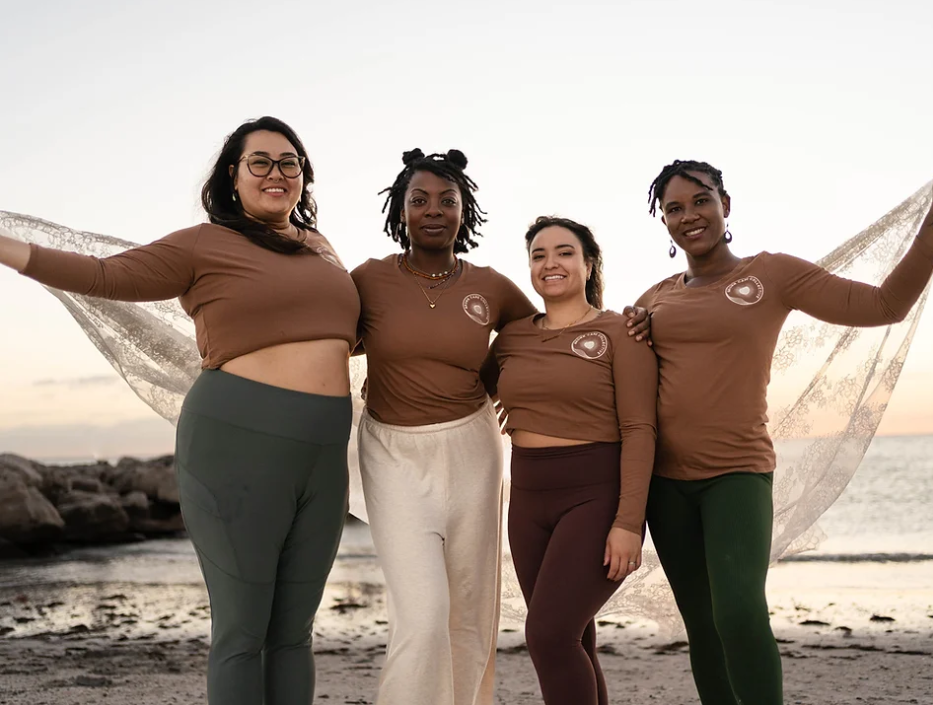
Duran thinks about her grandmother and her father, both of whom speak Spanish. She realizes that in most wellness spaces and yoga studios, differences in language and culture create a barrier, and she wants wellness to be available regardless of those differences. As a trauma-informed yoga teacher and breathwork facilitator, she creates a safe space so that those who have experienced trauma can enter into the world of wellness and find healing, belonging, and community.
Burris considers the feelings of inadequacy that sometimes plague Black and Brown people who are so accustomed to being the only people of color in a room. Brown Care Collective, she said, gives BIPOC the opportunity to take up space to experience yoga in its full iteration, which is designed as a means of freedom and liberation.
For DeChaine, Brown Care Collective is about representation and belonging. It’s about making space for all people: Black, Brown, fat, differently abled, non-English speakers, those who might not have the financial means, caregivers and children, those who have experienced trauma, queer — to experience wellness in its fullness rather than the watered-down version that has become so prevalent in Western culture. It’s about creating a space that reflects the community it serves.
Though Brown Care Collective is a relatively new endeavor formed in 2023, the four business owners and wellness experts have worked hard for years. The Collective brings them together as a unified force.
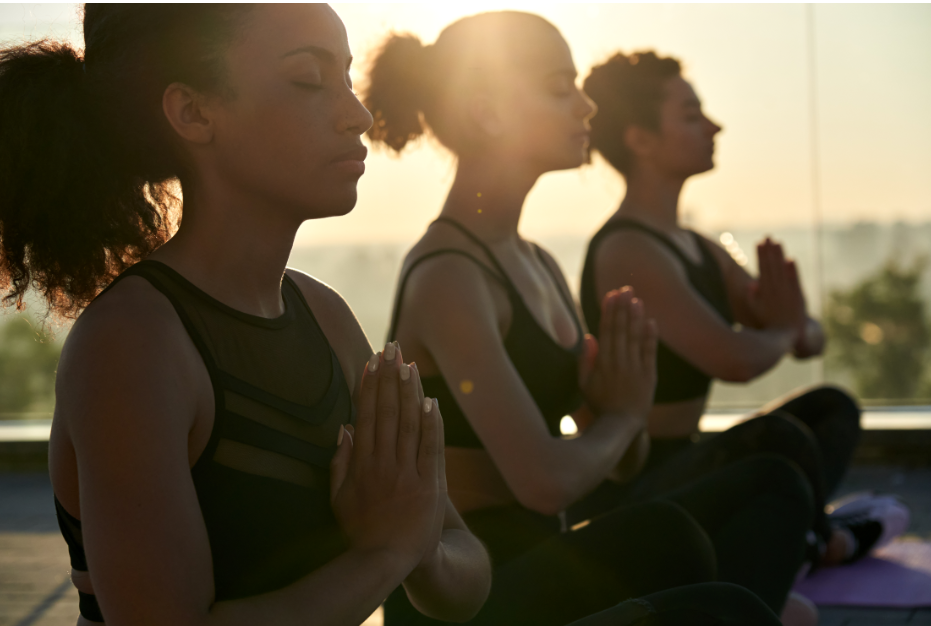
“It is so nice to see my empowered friends come forth and showcase their talents. We all have these strengths, and they complement each other so well,” said DeChaine.
Each month, they host a community yoga class at SukhaLife Yoga Studio in the Grand Central District called Are+Be. The four teachers rotate, teaching different styles of yoga in an accessible way that promotes inclusivity.
Brown Care Collective is also set to host the organization’s first conference entitled “Shifting the Culture: Activating Audacity.” It is scheduled for April 27 from 10-2 p.m. at the Center for Health Equity. The event is free to the community. Those who attend can expect Q&A sessions, workshops and talks from BIPOC wellness leaders. Food, music and raffles will round out the conference.
DeChaine said that rather than looking too far into the future about what’s next for Brown Care Collective, the owners are focused on what’s right in front of them — bringing healing to the community and focusing on collective care, a sentiment Burris echoes.
“I came from a family and community that was built on collectivism and community care. It is an honor to take care of my family, serve my community and be interdependent. I am bent on addressing the trauma that shows up in my body and my family and healing it. When I do that for myself — as we all do as part of Brown Care Collective — it sets the stage and pace for other families and communities to see what’s possible.”
Article Credit: theweeklychallenger